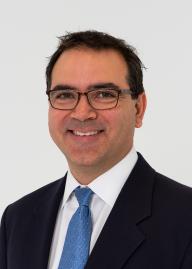
Dr. Yusuf Khan received his bachelor’s degree from Boston University in 1990, and master’s and doctorate degrees in Biomedical Engineering from Drexel University in Philadelphia in 1999 and 2005, respectively. His expertise is in the area of orthopaedic biomaterials, musculoskeletal tissue regeneration and regenerative engineering. His specific research interests are in the area of biodegradable polymer/ceramic composites for bone repair, low intensity ultrasound as a tool to enhance tissue-engineering-based tissue repair, and growth factor delivery. He is the co-author of 48 peer-reviewed journal articles and 13 book chapters, and is co-editor of 2 books, and several granted and pending patent applications.
Dr. Khan has served on the faculties of the University of Virginia (2005-2008) and the University of Connecticut (2008-present), where he is currently in the Department of Orthopaedic Surgery, Department of Biomedical Engineering, and the Department of Materials Science & Engineering and holds the rank of Associate Professor. He has been course director and lecturer in the course in Tissue Engineering for the past 9 years within the department of Biomedical Engineering and is currently the Curriculum Director in the Skeletal Biology and Regeneration program.
Dr. Khan has been active in the Society for Biomaterials for over a decade and has served as Chair, Vice Chair, and Program Chair of the Orthopaedic Biomaterials Special Interest Group and Vice Chair of the Biomaterials Education Special Interest Group. Dr. Khan also served as the Secretary for the Tissue Engineered Medical Products section of ASTM. Dr. Khan was also a committee member of the National Academy of Medicine’s Committee on the Public Health Effectiveness of the FDA 510(k) Clearance Process and is a co-author of the publication that arose from that committee in 2011. He has also served on the editorial board of the Journal of Biomedical Materials Research (part A). His work has been funded by both private and federal funding agencies including the Musculoskeletal Transplant Foundation, the Department of Defense, the National Science Foundation, and the National Institutes of Health.
